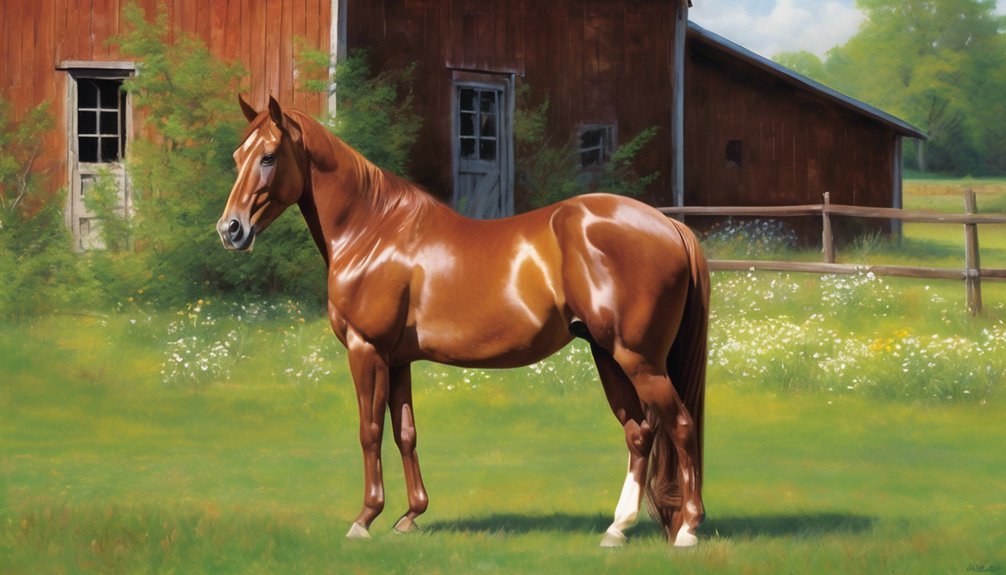
You know how important your horse's coat is for both appearance and health. Vitamins play a vital role in maintaining that shiny, vibrant look. Each vitamin contributes uniquely to skin integrity and overall well-being. For instance, Vitamin E acts as a powerful antioxidant, while Biotin strengthens hair follicles. Understanding these nutrients can help you prevent deficiencies that lead to dull coats. So, what specific vitamins should you focus on for optimal coat health?
Key Takeaways
- Vitamins are essential for maintaining overall health and a shiny coat in horses, impacting immune function and energy metabolism.
- Vitamin E acts as an antioxidant, enhancing skin barrier function and promoting a shiny coat by combating oxidative stress.
- Vitamin A is crucial for skin integrity; deficiencies can lead to dull coats and increased susceptibility to skin infections.
- B vitamins, particularly biotin, strengthen hair follicles, contributing to healthy hair growth and improved coat quality.
- Incorporating omega-3 fatty acids, zinc, and copper supplements can further enhance coat shine and overall health in horses.
Understanding the Importance of Vitamins for Horses
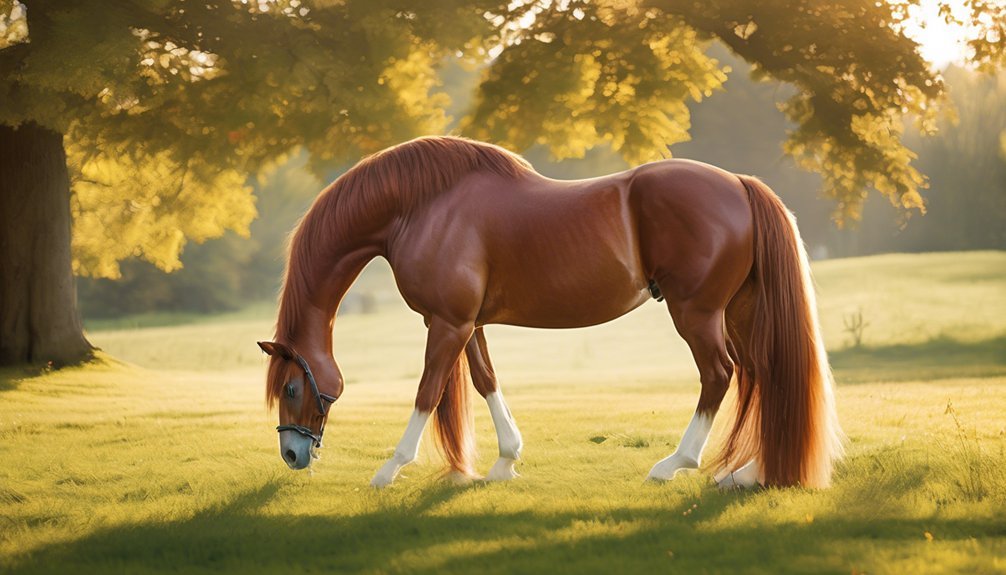
Understanding the importance of vitamins for horses is crucial for maintaining their overall health and well-being.
Vitamins play a vital role in various physiological processes, including immune function, energy metabolism, and the efficiency of vitamin absorption. When your horse receives a balanced diet rich in essential vitamins, you're ensuring optimal nutrient balance, which is key for proper growth and development.
A deficiency in specific vitamins can lead to serious health issues, affecting not only your horse's physical condition but also their mood and performance. By prioritizing vitamin intake, you're investing in your horse's longevity and vibrancy.
Regularly consult with your veterinarian to tailor a vitamin regimen that meets your horse's individual needs, ensuring they stay healthy and thrive.
Key Vitamins for a Shiny Coat
A glossy coat is often a reflection of a horse's overall health, and certain vitamins are essential for achieving that shine.
Vitamin E plays a crucial role in skin health and helps maintain that vibrant luster. You can find it in sources like green grass and vegetable oils.
Vitamin D, which promotes calcium absorption, is also vital for coat care, and can be obtained from sunlight and fortified feeds.
Additionally, the B vitamins, particularly biotin, are known to strengthen hair follicles.
Incorporating these vitamin sources into your horse's diet not only enhances coat health but also supports overall well-being.
The Role of Vitamin A in Coat Health
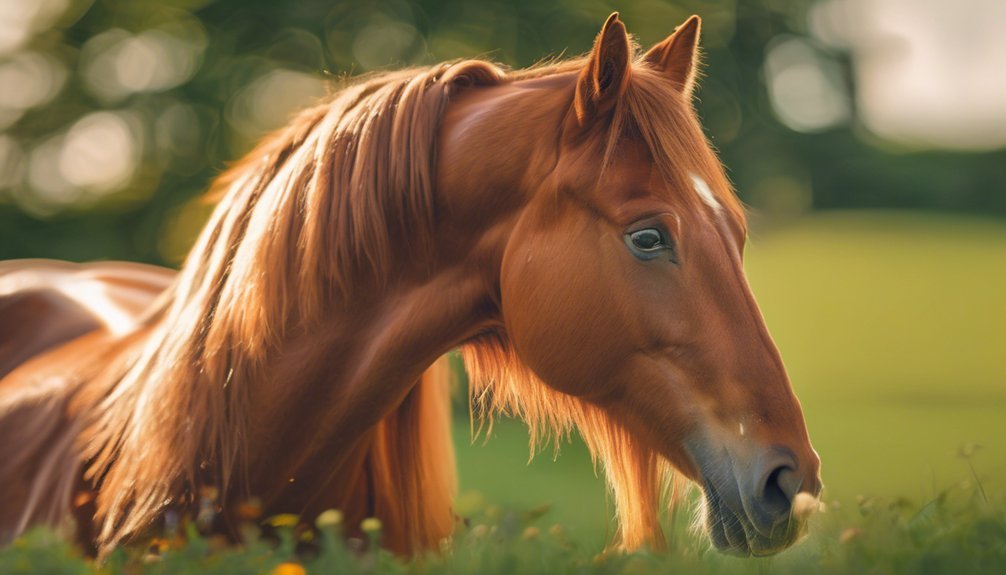
While you may focus on vitamins like E and D for your horse's coat health, Vitamin A plays a pivotal role that shouldn't be overlooked. This essential vitamin is crucial for maintaining skin integrity and promoting a luscious coat.
You can find Vitamin A sources in high-quality forage, carrots, and supplements specifically designed for horses. A Vitamin A deficiency can lead to dull, brittle coats and skin issues, making it vital to ensure your horse receives adequate amounts.
Symptoms of deficiency might include poor coat condition and increased susceptibility to infections. By prioritizing Vitamin A in your horse's diet, you're not just enhancing their appearance; you're also supporting their overall health and well-being.
Your horse will thank you with a radiant, shiny coat!
How Vitamin E Supports Skin and Coat
Vitamin E is essential for maintaining your horse's skin and coat health, as it acts as a powerful antioxidant that protects against cellular damage.
This vitamin contributes significantly to the skin barrier, ensuring your horse's skin retains moisture and remains resilient against harsh environmental factors.
By combating oxidative stress, Vitamin E benefits your horse by promoting a shiny, healthy coat and reducing the risk of skin irritations.
It supports proper circulation, aiding in nutrient delivery to skin cells, which is vital for overall skin health.
Regularly including Vitamin E in your horse's diet can enhance their coat's appearance and fortify their skin, making it an invaluable addition to their nutritional regimen.
Biotin: Essential for Hair Growth and Strength
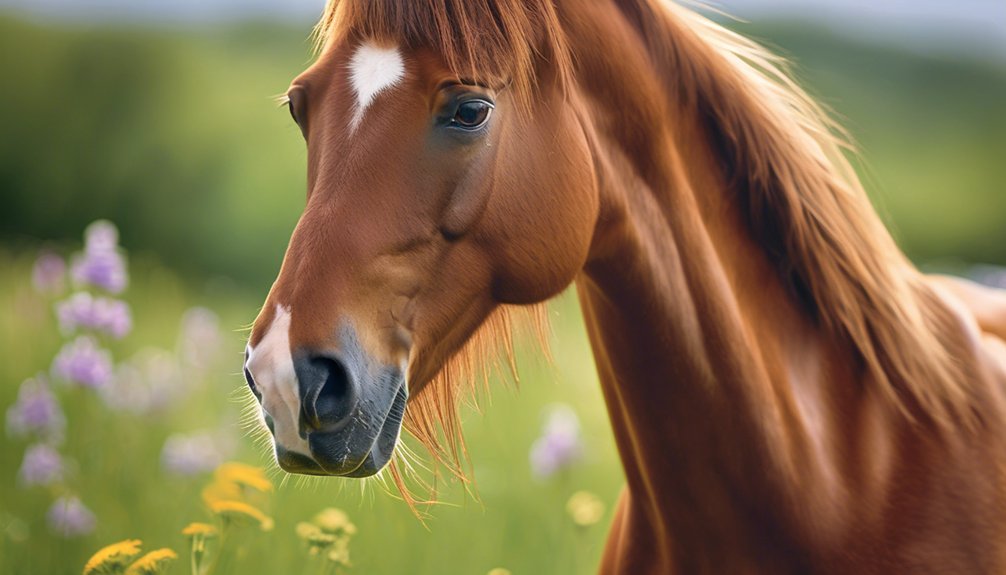
Biotin plays a crucial role in promoting hair growth and strength in horses, making it an essential component of their diet. This B-vitamin is vital for keratin production, which is the main protein in hair.
To ensure your horse gets enough biotin, consider incorporating biotin sources like alfalfa, oats, and certain commercial supplements into their feed. The recommended biotin dosage typically ranges from 15 to 30 mg per day, depending on your horse's size and specific needs.
Maintaining an adequate level of biotin not only supports a healthy, shiny coat but also strengthens hooves, contributing to overall equine well-being. By prioritizing biotin in your horse's nutrition, you're investing in their coat health and confidence.
The Impact of Omega Fatty Acids on Coat Condition
A well-balanced nutrition plan not only includes biotin for hair growth but also highlights the significance of omega fatty acids in maintaining a horse's coat condition. Omega fatty acids, particularly Omega-3 and Omega-6, are crucial for promoting a shiny and healthy coat. These nutrients reduce inflammation, improve hydration, and enhance overall skin health.
| Omega Sources | Fatty Acid Benefits |
|---|---|
| Flaxseed oil | Promotes shiny coat |
| Fish oil | Reduces skin inflammation |
| Chia seeds | Supports skin hydration |
Recommended Supplements for Optimal Coat Health
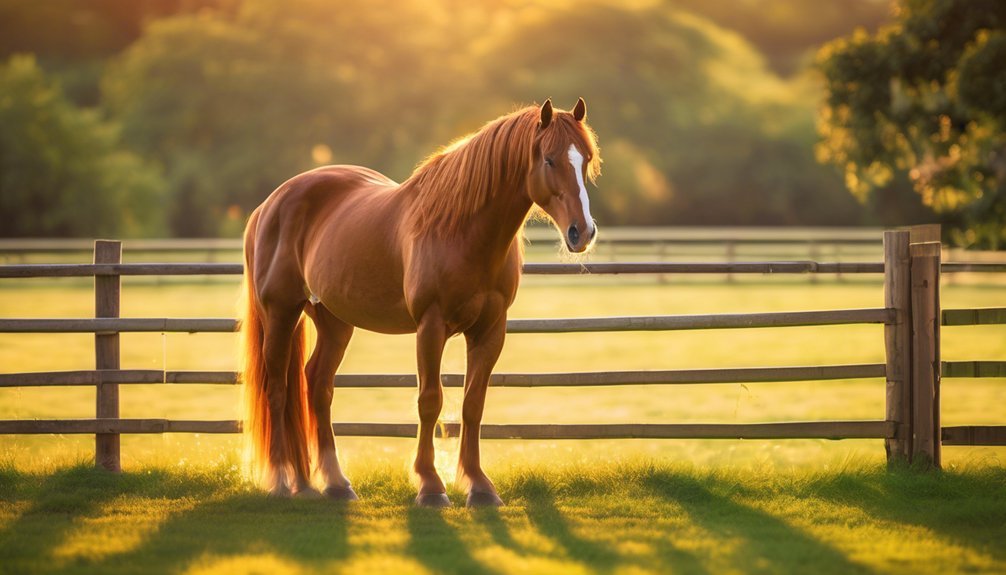
To ensure your horse's coat remains vibrant and healthy, incorporating specific supplements into their diet can make a significant difference.
Start with omega-3 fatty acids, found in fish oil or flaxseed, which support coat shine and moisture. Biotin, a B-vitamin, is another essential supplement type; it strengthens hooves and promotes hair growth, enhancing overall coat condition.
Additionally, zinc and copper are crucial minerals that improve pigmentation and coat health. If your horse's diet lacks these dietary sources, consider a high-quality commercial supplement designed for coat health.
Always consult your veterinarian to determine the right combination and dosage for your horse's individual needs, ensuring optimal benefits for their luxurious coat.
Frequently Asked Questions
Can Diet Alone Provide All Necessary Vitamins for Coat Health?
Diet alone might not provide all necessary vitamins for optimal coat health. Relying solely on dietary sources can lead to vitamin deficiencies, so consider supplements to ensure your horse receives a balanced nutrient intake.
How Long Does It Take to See Coat Improvements From Supplements?
You'll typically notice visible changes in your horse's coat within four to six weeks of starting supplements. Supplement timing plays a crucial role, so be consistent for optimal results and monitor your horse's progress closely.
Are There Any Risks for Overdosing on Vitamin Supplements?
Think of vitamins as a delicate dance; too much can lead to vitamin toxicity. Balancing supplements is crucial, as overdosing can cause serious health issues. Always consult a vet to keep your horse's health in harmony.
Can Environmental Factors Affect Vitamin Absorption in Horses?
Yes, environmental factors like sunlight exposure and moisture levels can impact vitamin absorption in horses. Adequate sunlight boosts vitamin D synthesis, while high moisture can hinder nutrient uptake, so consider these conditions in your horse's care.
Do Older Horses Require Different Vitamins for Coat Health?
As horses age, their nutritional needs shift like the seasons. Older horses may experience age-related deficiencies, requiring tailored vitamins for optimal coat health. Focusing on senior horse nutrition ensures their coats remain vibrant and healthy.
Conclusion
Incorporating essential vitamins into your horse's diet is like adding a secret ingredient to a recipe for a gleaming coat. By ensuring adequate levels of Vitamin A, E, and biotin, you're nurturing not just a shiny exterior but also robust skin and hair growth. Remember, a vibrant coat reflects your horse's overall health and vitality. With the right nutrients, you're not just enhancing appearance; you're fostering a thriving companion ready to shine in every stride.





